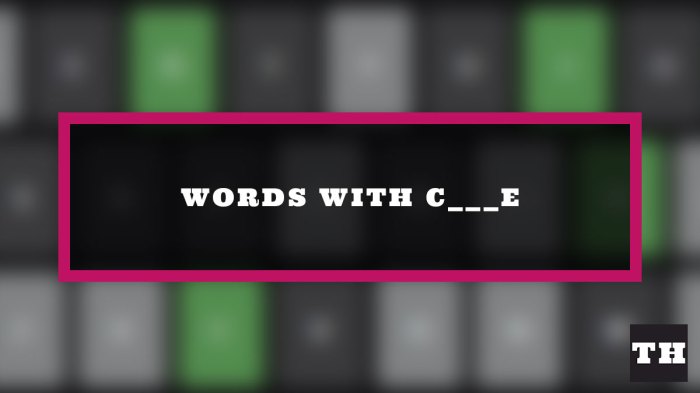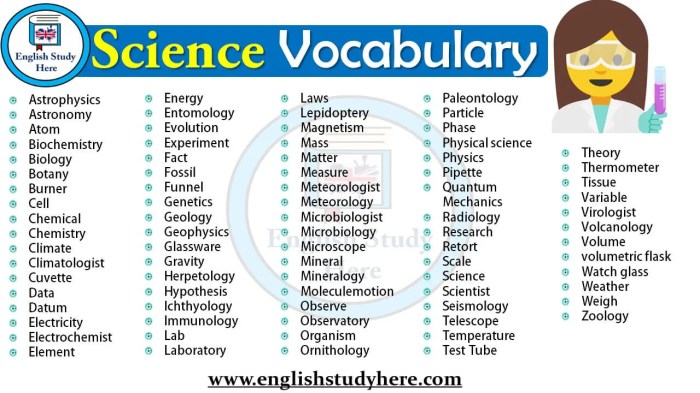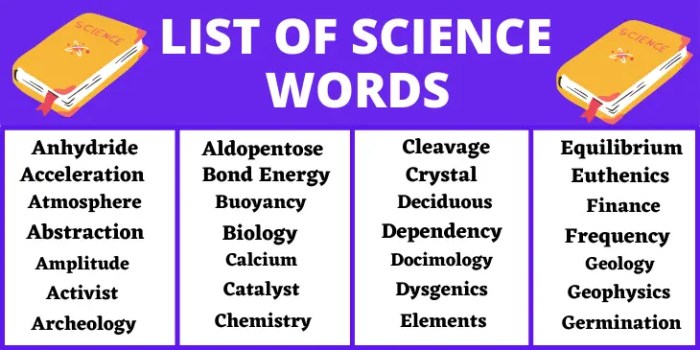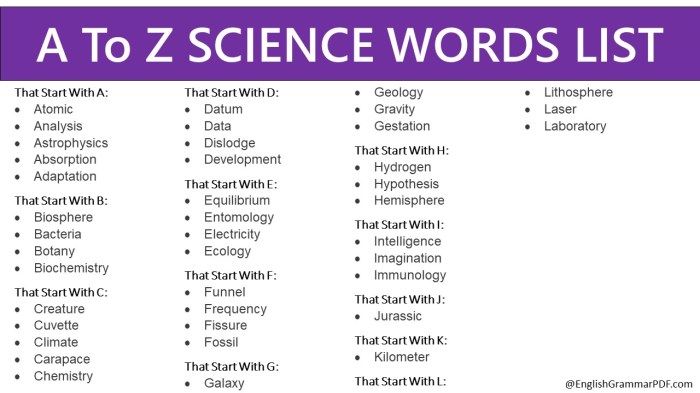Embark on a captivating journey into the realm of science words starting with C, where we unravel the mysteries of scientific vocabulary and delve into the fascinating world of knowledge. From chemistry to biology and beyond, this comprehensive guide will illuminate the origins, meanings, and applications of these essential terms.
As we delve into the intricacies of scientific language, we will explore the diverse categories and disciplines that shape these words, examining their relationships and connections. Real-world examples and practical applications will bring these concepts to life, showcasing the impact of scientific vocabulary on our understanding of the world.
Concepts and Terminology

In the realm of scientific vocabulary, ‘science words starting with c’ encompass a diverse array of terms that form the foundation of various scientific disciplines. These words represent concepts, phenomena, and entities that play crucial roles in advancing our understanding of the natural world.
List of Science Words Starting with C
The following is a comprehensive list of science words starting with the letter ‘c’:
- Calorie
- Carbon
- Cell
- Centrifuge
- Chromatography
- Circuit
- Climate
- Cloud
- Coefficient
- Combustion
- Conductor
- Conservation
- Constant
- Control
- Coordinate
- Correlation
- Cosmos
- Coulomb
- Crystal
- Current
- Cycle
Etymology and Origins
The etymology of science words starting with c reveals a rich tapestry of linguistic influences. Many of these terms originate from Latin, Greek, or Arabic roots. For instance, the word ‘calorie’ derives from the Latin word ‘calor,’ meaning ‘heat,’ while ‘cell’ comes from the Latin word ‘cella,’ meaning ‘small room.’
The term ‘chromatography’ is derived from the Greek words ‘chroma,’ meaning ‘color,’ and ‘graphein,’ meaning ‘to write,’ reflecting the technique’s use in separating and identifying different colored substances.
Classification and Categories

The science words starting with ‘c’ can be categorized into different scientific disciplines, including chemistry, biology, physics, and other related fields. By organizing these words into categories, we can establish connections and relationships between them based on their shared characteristics and scientific principles.
Exploring science words starting with the letter c, we stumble upon the concept of “preemptive right.” Preemptive right refers to the privilege of existing shareholders to buy new shares before they are offered to the public. Continuing our scientific exploration, we delve into additional words beginning with c, such as catalysis and chromatography, further expanding our understanding of the vast vocabulary of science.
Chemistry
- Carbon: A versatile element that forms the basis of organic molecules.
- Catalyst: A substance that speeds up a chemical reaction without being consumed.
- Chemical bond: The attractive force that holds atoms together.
- Compound: A substance composed of two or more elements chemically combined.
Biology
- Cell: The basic unit of life.
- Chromosome: A structure in the cell nucleus that contains genetic information.
- Cytoplasm: The jelly-like substance inside the cell.
- Chloroplast: An organelle in plant cells that carries out photosynthesis.
Physics
- Capacitance: The ability of a capacitor to store electrical energy.
- Circuit: A closed loop through which an electric current flows.
- Convection: The transfer of heat by the movement of fluids.
- Current: The flow of electric charge.
Examples and Applications

Science words starting with “c” are ubiquitous in scientific research, experiments, and real-world applications. These words provide a precise vocabulary for describing complex scientific concepts and phenomena, facilitating communication and collaboration among scientists.
The concept of classification, for instance, plays a crucial role in organizing and understanding the vast diversity of life on Earth. Taxonomists use classification systems to categorize organisms into hierarchical groups based on shared characteristics, allowing for systematic study and comparison.
Case Study: Classification in Taxonomy
The Linnaean system of classification, developed by Carl Linnaeus in the 18th century, is a widely used example of classification in taxonomy. This system assigns each species a unique two-part name, known as the binomial nomenclature. The first part of the name identifies the genus to which the species belongs, while the second part is the specific epithet that distinguishes it from other species within the same genus.
The Linnaean system has been instrumental in organizing and cataloging millions of species, enabling scientists to study their relationships, evolution, and distribution. It provides a common language for scientists around the world, facilitating communication and collaboration in the field of biology.
Comparative Analysis

In the realm of science, the letter ‘c’ heralds a diverse array of terms that play pivotal roles in shaping our understanding of the natural world. By comparing and contrasting these words, we gain a deeper appreciation of their meanings, usage, and scientific significance.
Similarities, Science words starting with c
Underlying the diverse science words starting with ‘c’ is a common thread: they all contribute to the advancement of scientific knowledge. Whether it’s classification, categorization, or comparison, these words provide essential tools for organizing, analyzing, and interpreting data.
Differences
Despite their shared purpose, science words starting with ‘c’ exhibit distinct differences in their specific functions and applications. Classification, for instance, involves organizing objects or phenomena into hierarchical groups based on shared characteristics. In contrast, categorization involves assigning objects or phenomena to predefined categories based on specific criteria.
Nuances and Distinctions
To fully grasp the nuances and distinctions between these science words, it’s crucial to examine their usage in context. Consider the terms “comparison” and “contrast.” While both involve examining similarities and differences, comparison focuses on identifying points of similarity, while contrast highlights points of difference.
Historical Evolution: Science Words Starting With C
Science words starting with ‘c’ have undergone a fascinating historical evolution, mirroring the advancements and paradigm shifts in scientific understanding. Over time, these words have witnessed changes in their meanings, usage, and the underlying scientific concepts they represent.
Technological advancements, groundbreaking discoveries, and evolving scientific perspectives have played pivotal roles in shaping this evolution. As our knowledge expanded and scientific methodologies refined, so too did the language used to describe and communicate scientific ideas.
Factors Influencing Evolution
- Technological Advancements:New technologies, such as microscopes and spectrometers, enabled scientists to observe and analyze phenomena at unprecedented levels of detail, leading to the discovery of new elements and the refinement of existing theories.
- Breakthrough Discoveries:Major scientific breakthroughs, like the theory of evolution and the discovery of radioactivity, necessitated the creation of new terms and concepts to explain these novel phenomena.
- Shifts in Scientific Paradigms:Changes in fundamental scientific beliefs, such as the transition from the geocentric to the heliocentric model of the solar system, required a re-evaluation of existing terminology and the introduction of new concepts.
Cultural and Societal Impact

Words starting with ‘c’ in science have had a profound cultural and societal impact. They have shaped our understanding of the world, influenced scientific discourse, and contributed to technological progress. These words have also played a significant role in shaping scientific literacy and public engagement with science.
Scientific Literacy and Public Engagement
Science words starting with ‘c’ have helped to increase scientific literacy among the general public. Words like ‘cell’, ‘chromosome’, and ‘climate’ are now commonly used in everyday conversations, indicating a growing understanding of scientific concepts. This increased literacy has led to greater public engagement with science, as people are more likely to participate in scientific discussions and make informed decisions about science-related issues.
FAQ Resource
What is the etymology of the term ‘calorie’?
The term ‘calorie’ originates from the Latin word ‘calor,’ meaning ‘heat.’ It was first used in the 18th century to describe the amount of heat required to raise the temperature of one gram of water by one degree Celsius.
What is the difference between ‘hypothesis’ and ‘theory’?
A hypothesis is a proposed explanation for a phenomenon that is based on limited evidence. A theory, on the other hand, is a well-substantiated explanation that has been repeatedly tested and supported by a substantial body of evidence.